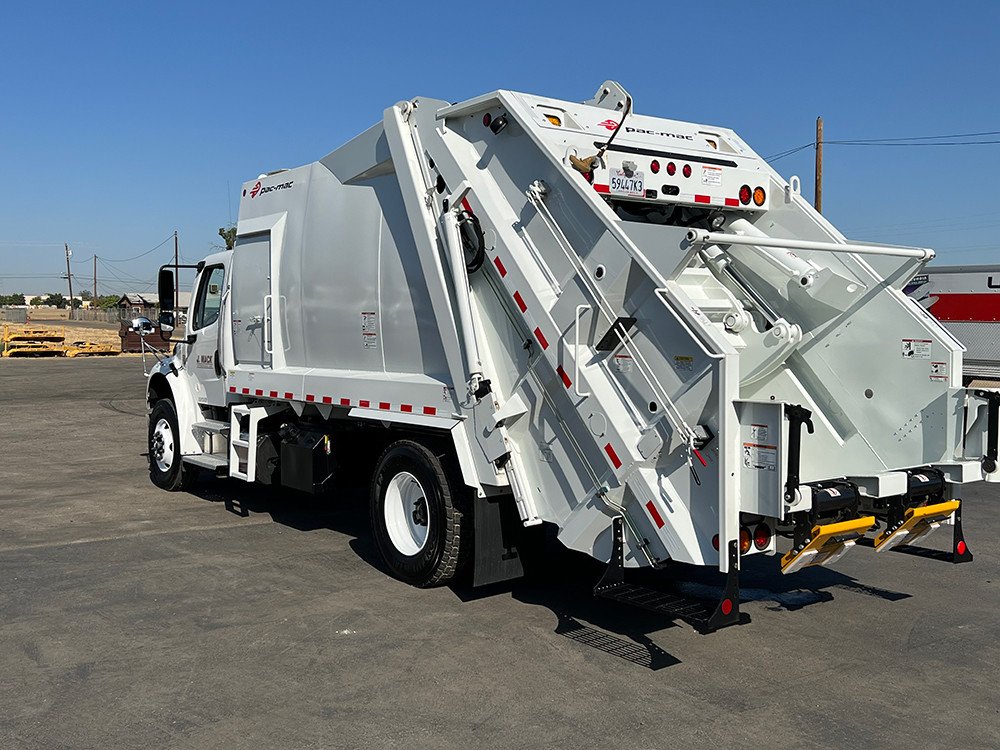The global waste management market size is projected to reach approximately USD 1.35 trillion in 2025, driven by increasing urbanization, rising environmental regulations, and growing waste generation worldwide. This booming market underscores the urgent need for more efficient and flexible waste management solutions.
For many companies, owning fleets of garbage trucks can be costly and inflexible. Trash truck rentals offer a scalable, cost-effective solution that provides modern, technologically advanced vehicles for waste operators across the U.S., particularly in the Midwest region. This blog explores why rentals are becoming essential for managing growing waste volumes with sustainability and operational efficiency in mind.
Rising Demand for Efficient Waste Management in Urban and Rural Areas
Every year, both urban and rural areas generate increasing amounts of waste. This creates unique challenges for waste management companies that must tailor their operations accordingly:
- Urban Areas: Metropolitan regions with growing populations need frequent, reliable pickups. The high density means trucks must run multiple routes daily, requiring fleets that operate efficiently in congested environments.
- Rural Areas: Rural routes demand durable trucks that can cover longer distances with less infrastructure. Flexibility in fleet size and truck type is necessary to maintain consistent service over wider geographic areas.
Why Rentals Help Meet These Challenges:
- Renting trash trucks offers quick access to additional vehicles during busy seasons or contract expansions.
- Rental agreements allow companies to scale fleets up or down quickly depending on demand, eliminating downtime.
- This flexibility ensures waste management businesses maintain uninterrupted service and meet contractual obligations across a diverse range of urban and rural service areas.
By using rental fleets, companies stay agile and ready to respond to fluctuating waste volumes and geographic needs effectively.
Why companies are choosing rentals over ownership in 2025
In 2025, ownership of heavy-duty trucks became less practical. Inflation, rising loan rates, and escalating vehicle costs strain budgets. The pace at which waste technology evolves also makes ownership risky, as trucks can be outdated within years.
Companies now choose rentals because they offer:
- Faster access to vehicles ready for immediate use.
- Ability to expand fleets for short- or long-term projects.
- Freedom from resale concerns when trucks age or become obsolete.
Rentals let companies focus on growing service contracts without being tied down by costly, depreciating assets.
Setting the stage: sustainability, scalability, and cost-efficiency
Today’s waste management market prioritizes three business drivers:
- Sustainability: Clients demand cleaner fleets. Rental providers supply electric and hybrid trucks without requiring full ownership investments.
- Scalability: Companies can scale their fleets to match seasonal or municipal demands.
- Cost-efficiency: Rentals reduce upfront capital outlay and streamline budgets, ensuring funds are free for operations and workforce investment.
These three pillars explain why more waste operators see rentals as the smarter long-term strategy.
Cost-Efficiency and Financial Flexibility
Owning a garbage truck requires a large upfront investment, often over $300,000, which can limit growth for smaller waste companies. Trash truck rentals offer a smart alternative by providing access to heavy-duty vehicles without tying up capital.
Renting shifts expenses from costly upfront purchases (CAPEX) to manageable monthly payments (OPEX), improving cash flow and balance sheet health.
Additionally, rentals simplify budgeting with fixed, transparent monthly fees, avoiding unexpected repair or depreciation costs.
Key Benefits:
- Avoid large upfront costs
- Convert capital expenses into predictable operating costs
- Preserve cash for expansion and operations
- Simplify financial planning with fixed payments
Choosing rentals allows companies to focus on business growth rather than asset ownership burdens.
Reduced Maintenance Expenses
Owning garbage trucks involves costly ongoing maintenance, repairs, and parts replacement, which can strain budgets over time.
By renting, the maintenance responsibility shifts to the provider. Most rental agreements include regular servicing and repairs, saving businesses time and money. Additionally, if a truck breaks down, rental companies often provide quick replacements, ensuring continuous waste collection without delay.
Key Benefits
- No long-term upkeep costs
- Maintenance and repairs included
- Rapid replacements during breakdowns
- Lower risk of unexpected expenses
Renting allows companies to focus on smooth, uninterrupted operations without the burden of maintenance.
Lower Depreciation Risks
When managing large fleets, asset depreciation is a costly and unavoidable challenge. However, renting trash trucks presents a way to sidestep these losses entirely.
Additionally, rental agreements offer flexibility that permits upgrading to newer trucks without the financial burden of selling aging vehicles at a loss.
- Companies avoid asset depreciation losses
Heavy vehicle ownership means fighting against constant depreciation. Trucks lose value every year, and resale rarely offsets the purchase price. With rentals, asset value loss is a concern for the provider; operators simply return and renew when newer models become available.
- Flexibility to swap trucks without financial strain
Rental programs allow businesses to upgrade to newer truck models without absorbing significant selling losses. This flexibility makes it easier for companies to present fleets that meet customer expectations.
Access to Advanced Fleet Technology
Technology is transforming trash truck rentals with innovations that enhance efficiency and reduce labor costs. Modern rental trucks come equipped with features like real-time tracking and automation, streamlining operations and improving service quality.
Key benefits include:
- Real-time tracking for better route management
- Automated systems that reduce operational strain
- Rapid access to the latest technology with each rental renewal
Renting ensures businesses stay competitive by continually operating with cutting-edge equipment, without the burden of ownership costs.
Telematics and Route Optimization
Rental fleets often come with advanced telematics like GPS, fuel monitoring, and performance analytics. These provide real-time data on driver behavior, vehicle health, and delivery efficiency.
By using GPS and route optimization, waste companies reduce idle time and unnecessary mileage, leading to lower fuel use, reduced labor hours, and fewer overtime costs.
Key benefits:
- Real-time truck and driver tracking
- Optimized routes to cut fuel use and travel time
- Continuous fleet performance monitoring
- Lower labor and fuel expenses
Sustainability-Focused Vehicles
As environmental regulations tighten, there is growing pressure on waste management companies to adopt cleaner technologies. Electric (EV) and hybrid trash trucks offer an effective solution but usually require hefty upfront investments.
Renting allows businesses to access these eco-friendly vehicles without large capital expenses. This enables faster compliance with evolving environmental standards and supports corporate sustainability goals.
Advantages of rental fleets include:
- Access to modern EV and hybrid trucks without huge upfront costs
- Easier compliance with stringent emissions regulations
- Reduced environmental impact and carbon footprint
Operational Agility and Scalability
Waste contracts often fluctuate due to seasons, special events, or project-specific demands. Rentals provide the flexibility to scale fleet size up or down based on these changing needs without long-term commitment.
Furthermore, rental providers often supply quick replacements in case of truck breakdowns, ensuring uninterrupted service and protecting client relationships.
Operational benefits:
- Ability to rapidly expand or contract fleets
- Fast truck replacements during high-demand periods or maintenance issues
- Maintains service reliability during workload peaks
Meeting City and Municipal Contracts
Municipal contracts frequently require large fleet capacities to compete effectively. Rental services let companies adjust their fleets quickly to meet these bidding requirements without committing to permanent purchases.
By maintaining a reliable rental fleet, companies can consistently deliver waste collection services on time, fostering stronger government relationships.
Key points:
- Quick fleet adjustments for contract bids
- Reliable, consistent waste service delivery
- Improved competitiveness for municipal contracts
Reduced Downtime
Breakdowns can cripple waste collection schedules, risking contract penalties and customer dissatisfaction. Rental agreements typically provide immediate access to backup trucks, minimizing operational disruptions.
This reduces downtime, protects productivity, and maintains customer trust.
Benefits include:
- Ready availability of replacement trucks
- Maintains operational continuity
- Prevents productivity losses and customer complaints
Compliance and Regulatory Advantages
Rental fleets are usually maintained to the latest safety and emissions standards, simplifying regulatory compliance for waste companies. Using rental trucks reduces the risk of penalties associated with outdated, non-compliant vehicles.
Compliance perks:
- Updated trucks meeting federal guidelines
- Avoidance of fines from non-compliance
- Simplified fleet modernization efforts
Easier Fleet Modernization
Government emission targets and safety requirements evolve rapidly. Renting ensures access to modern trucks aligned with these changing standards without the need for costly reinvestments.
Rental providers frequently update their fleets, enabling companies to avoid penalties and stay ahead of regulations.
Modernization benefits:
- Alignment with current emission and safety laws
- Reduced financial outlay for fleet updates
- Lower risk of regulatory non-compliance
Enhancing Sustainability Goals
Modern eco-friendly rental fleets support corporate sustainability initiatives. Using cleaner trucks helps companies lower their carbon footprints and improve their Environmental, Social, and Governance (ESG) scores.
Sustainability advantages:
- Access to fuel-efficient and zero-emission vehicles
- Supports corporate green initiatives
- Strengthens ESG credentials
Customer Perception and Trust
Clients, primarily municipal and corporate ones, prefer companies that operate environmentally responsible and up-to-date fleets. Renting green trucks enhances brand reputation and builds trust in competitive markets.
Trust-building factors:
- Demonstrates commitment to sustainability
- Strengthens brand image in ESG-focused markets
- Provides a competitive edge in bids
Future-Proofing Waste Management Businesses
The waste industry is rapidly evolving with new technologies, fuel price changes, and regulatory shifts. Rental models offer agility to adapt without costly investments in aging fleets.
This flexibility ensures businesses remain competitive and technologically current in a fast-changing environment.
Future-proofing highlights:
- Ability to adjust fleet with evolving technology and regulations
- Reduced capital risk associated with ownership
- Continuous innovation opportunities
Preparing for Autonomous Fleet Integration
Autonomous trash trucks are emerging as the next significant shift in waste management. Renting enables companies to pilot-test these vehicles without incurring heavy R&D or capital expenditures, thereby staying ahead in innovation.
Benefits for autonomous adoption:
- Low-risk access to autonomous technologies
- Early market leadership without significant investments
- Smooth transition to future fleet models
Conclusion
Trash truck rentals give waste management companies much more than financial breathing room. They cut major upfront costs, reduce downtime, and deliver cleaner fleets aligned with sustainability goals. Rentals also empower businesses to scale operations quickly, win municipal contracts, and remain competitive as tech evolves.
For waste management firms across the Midwest and the United States, TrashTruckRental represents not just a service option but a strategic advantage. By providing access to advanced fleets that balance cost-efficiency, sustainability, and dependability, regular truck rentals fuel growth, innovation, and responsibility in waste management.

